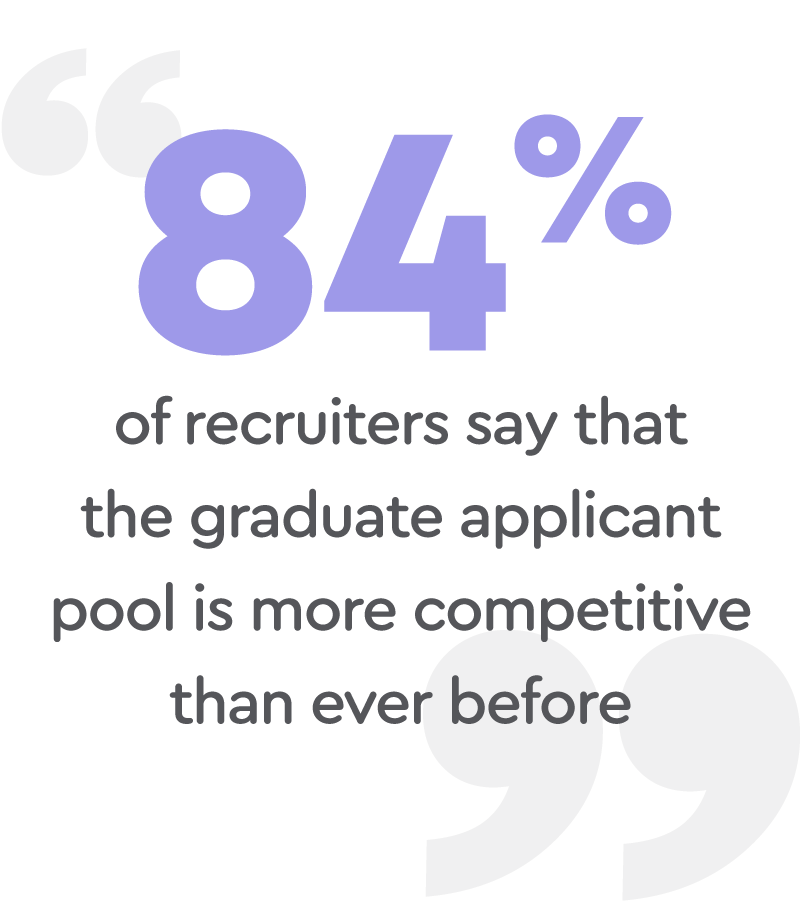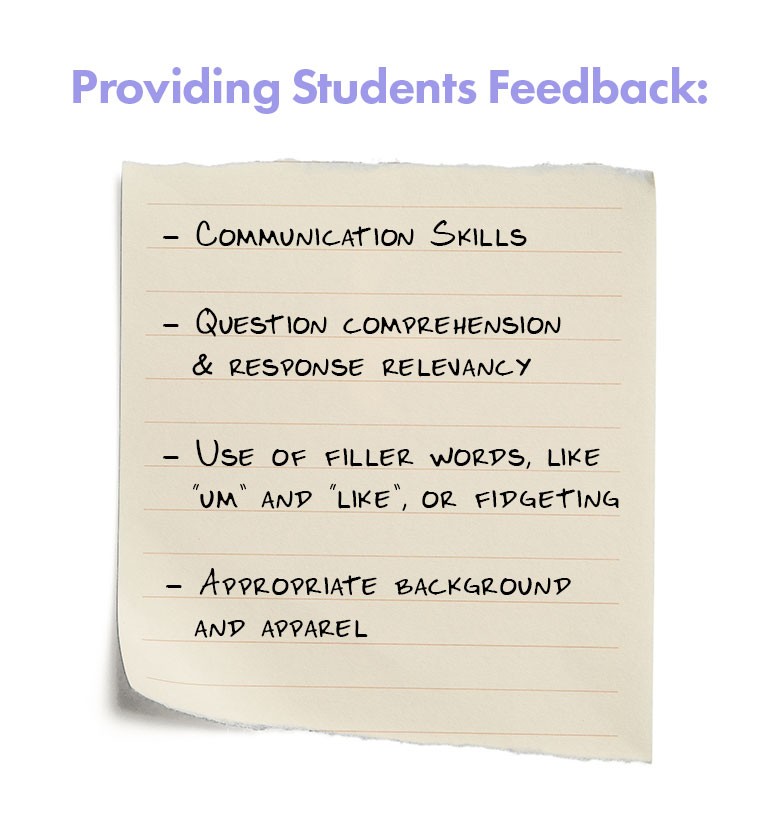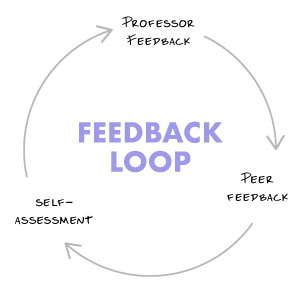3 Steps to Integrate Virtual Job Interviews Into Your College Curriculum This Semester

College grads are facing challenges unique to today’s workforce. Beyond the normal stress that comes with entering a new chapter of life, students are preparing to join a job market that’s still self-correcting from the COVID-19 quarantine that began in early 2020.
Countless companies are operating in limbo, making high-stakes decisions daily or weekly about in-office work plans and organizational structures that are in flux in a way that is unprecedented. As a result, many organizations are either working 100% virtually or taking a blended approach — incorporating work from home and in-office working options — in attempts to support their employees most effectively.
Look at this research that Stanford university compiled from June 2020:
- 42% of the U.S. labor force was working from home full-time, with no plans to go back to the physical office
- Another 33% weren’t working at all
- The final 26% were working in person, the majority being essential service workers
- That’s nearly twice as many employees working from home than from a physical business
This drastic, almost overnight, shift to WFH has caused hiring processes that would have once been face-to-face to now take place behind a screen. Instead of practicing handshakes and printing out resumes before the big day, interviewees are double-checking internet connections and updating LinkedIn bios. Not to mention, making sure their lighting is flattering and their background is interesting (but not too interesting) for the interview.
While the switch to remote interviewing can feel intimidating to even the most seasoned pros, one of the elements that makes it unique is its universal benefit. Virtual interviews don’t just make hiring easier for recruiters, they reduce the margin for error in the interview process for candidates as well — or at least the jobseekers that know how to make the tech work for them.
For example, when candidates record one-way video interviews, they usually get two or three attempts to answer a question. So, if they have jitters, stumble over words, or lose their train of thought, they can gather themselves and try again. We’re only human — mistakes are bound to happen, but the opportunity to overcome those simple missteps and perfect an interview recording could be the difference between landing a second round or being counted out altogether.
That’s why it’s critical for students to understand the nuances of virtual interviewing before they’re sent out into the real world: at least 86% of employers are already using some form of video in the hiring process, a figure that’s only expected to grow in the coming months and years. To compete for highly sought-after positions, students need to enter the workforce equipped with remote interviewing skills.
Online interview preparation tools like interview prep are designed for that exact purpose — to prep graduates for a virtual interview process. Colleges and universities are able to extend mock interviews to students, using the same platform that companies like Johnson & Johnson, Dell, AT&T, and more use to hire talent every day.
Here’s how professors and career advisors are able to integrate interview preparation software into their curriculum over the course of this semester:
1. Initial practice & baseline feedback
Kick off with a bang: include a mock interview in your syllabus with little to no context. The questions you ask don’t have to be hard-hitters, even the most generic q’s will give you insight into a student’s baseline skill- and comfort-levels.
Go through each students’ recorded responses and provide individual feedback on key areas like:

Take note of mistakes or faux pas that you’re seeing consistently in all of the students’ interviews and address them in your lesson planning. Then ask them more questions to understand the root of these tendencies — are students having challenges due to a lack of interview experience or a lack of virtual interview experience?
Next, offer actionable techniques to help students break their bad habits and improve their interview performance. Also, encourage them to perform more mock interviews in their free time (don’t worry: interview prep has pre-populated question banks, so you won’t have to keep scrambling for new questions).
2. Peer-to-peer feedback
Around mid-terms, take a gut-check. Request that students record another video interview, this time more specifically tied to what they’ve been learning in class or a timely or topical event — something that they know enough about to give an informative, thoughtful response.
This time around, instead of providing feedback yourself, pair students up with a peer and have the two assess each other’s progress between interview #1 and interview #2. Have them:
- Pinpoint areas where they see improvement
- Re-hash any mistakes that weren’t fixed from the initial interview
- Address skills that could use further development
- Provide actionable tips & guidance
- Ask each other questions about the other’s perspective & why they answered the questions the way that they did
In the interview process, participants tend to place a lot of focus on appearance and body language (to be fair — psychologists say it only takes seven seconds to make a first impression). Since on demand video interviews are recorded and shared, the content of what a candidate is saying can be more thoroughly scrutinized. Part of the value of interview preparation and practicing with mock interviews is exposing students to various approaches and potential responses to the same question.
By training students to think beyond the surface level to get to the heart of a response and then showing them a variety of different answers, you can help them to develop more thoughtful and diverse responses, increasing the likelihood that they stand out when it comes to an actual interview.
3. Self-assessment
As a part of your final project, extend a third and final mock interview. Ask questions about the material they’ve learned from the semester (or since the midterm) and how they would apply that knowledge in a hypothetical role.
Once they’ve submitted their recordings for your feedback, reveal part two of the exam: completing a self-assessment.
Using the feedback that they’ve received from you and their peers, have them consider criteria, such as:
- The key differences throughout the recordings
- Skills that they’ve developed & skills that need further improvement
- Their comfortability & confidence from the first interview to the third
- If (& how) they would change any of their responses
Having your students watch and review their own body language and communication styles is a great way to close the feedback loop and drive home the feedback that they’ve received over the months.

Help your students develop key skills to thrive in their careers
84% of recruiters say that the graduate applicant pool is more competitive than ever before. As with anything in life, preparation is the key to success. Many students have little to no experience when it comes to interviewing — in the past, graduates could practice interviews with friends and family, but for the most part, entered the workforce and learned firsthand what works (and what doesn’t).
Now, with interview preparation, students have the opportunity to work out the kinks of the process, strengthening their interviewing skills and becoming comfortable with remote interviewing tech. Start working with your college students to develop realistic interview expectations and virtual skill sets so you can send them off to start their careers with confidence.
See the results for yourself when you sign up for interview prep. Chat with a client success expert today!
About The Author
Nick is an Account Executive at interviewstream. He’s a Chicago native through and through -- at any given time, you’ll probably find him watching one of the Windy City’s pro sports teams, or rooting for his alumnus, University of Illinois.
